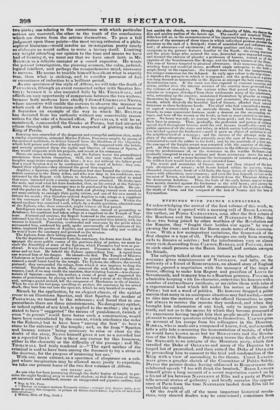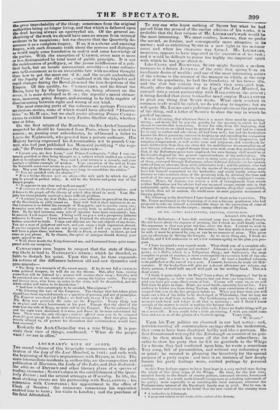EVENINGS WITH PRINCE CAMBACERES.
IN acknowledging the arrival of the first volume of this work, we mentioned that it opened with a morning call of Baron LANGON, the author, on Prince CAMBACERES, soon after the first return of the Bourbons and the banishment of NAPOLEON to Elba; that this° two being joined by other worthies of the Revolution and the Empire, they "fought their battles o'er again" by way of passing the time ; and that the Baron made notes of the converse- Ii tits. With a few unimportant variations, the framework of the first chapter is a type of all. The changes are only from morning calls to dinners or soirees ; but the interlocutors vary on almost every visit, descending from CARINOT, BA RRAS, and FOLIC HE, down to such small persons as the Baron himself, and certain anonymi his friends.
The subjects talked about are as various as the talkers. CAM. BACERES gives reminiscences of NAPOLEON, and tells, on the authority of a friend of ROBESPIERRE, an absurd story of England having ,opened a negotiation with the manager of the reign of terror, offering to make him Regent and guardian of Louis the Seventeenth, and to marry him to a Bourbon princess. FOUCHE, in admirable keeping with his character, entertains his hearers with a number of extraordinary incidents, or mystifies them with tales of a supernatural kind which fell under his notice as Minister of Police; but not a word of politics. He however dropped a politic maxim that many in an analogous situation may find useful,—never to dive into the motives of those who offered themselves as spies, but always to receive the reasons they rendered, and when they brought him information of any kind, only to inquire into its truth, and not as to the means by which they became possessed of it ; experience having taught him that people mostly found it un- pleasant to answer questions relating to themselves. CARNOT gives au account of his escape from his colleagues in the Directory. B sISRAS, who is made out a compound of knave, fool, end coxcomb,
tells a silly tale concerning the transmutation of metals, of which he would have known more but for BoNAPsees: and the Revolu-
tion of the 18th Brumaire. RCEDERER traces the death of Louts the Sixteenth to an intrigue of the Mountain party, which first terrified the Duke of ORLEANS and many of the Deputies by a forged list of proscribed, and then ruined the Duke of ORLEANS by persuading him to consent to the trial and condemation of the King with a view of succeeding to the throne. Count LAINJUI. NAIS gives a graphic sketch of the Committee of Public Safety. DAvio the painter denies having addressed to ROBESPIERRE the celebrated speech "I too will drink the hemlock." Baron LANoosi
himself gives a long account of a secret negotiation carried on by a friend of his between NAPOLEON at Elba and a party at Paris; tells several stories of gallantry ; and briefly narrates the appear- ance of Paris from the time NAPOLEON landed from Elba till he reached the capital.
Of the truth of' all of the more important historical revela- tions, very shrewd doubts may be entertained ; sometimes from the gross improbability or the thing; sometimes from the original statliorltles being no longer living, and that which is fathered upon the dead having always an apocryphal air. Of the general au- thenticity of the work we should have seen no reason from internal evidence to be suspicious; but we observe that the Quarterly de- nounces it as a complete Mrgery. If so, it is a clever and amusing
forgery, with such dramatic truth about the persons and dialogues
as would imply some foundation in reality and some knowledge of the parties. With the exception of CARROT, every man is More
ot less distinguished by total want of public principle. It is not
the recklessness of profligacy, or the jocose indifference of a poli- tical hack, but an innate unconscious servility—a tame submis-
sion to Government as to an irresistible fate. with no other thoueht
than how to get the most out of it; and the result undoubtedly of the loyalty of the old Cour , combined with the frightful and
rapid changes during the Revelation and the iron despotistn of the Empire. Of this quality, too CAMBACERES, and his friend the Baron, have by far the largest .hare, or, being oftenest on the
scene, it is more developed in ti in; the reporter's moral obtuse- ness, moreover, going deeper, anti seeming to be little capable or discriminating between right and wrong of any kind. The most amusing parts of the volumes are perhaps Foucea's mysterious stories, some of which would have afforded " illustra- tions " to Mr.WARD; but we shall prefer allowing Prince CAMBA- CERES to exhibit himself in a very Justice Shallow style, whether true or false.
On the first return of the Bourbons, the Ex-Arch-Chancellor suspected he should be banished from Paris, where he wished to remain ; so, passing over subordinates, lie addressed a letter to Louis the Eighteenth, who granted hitn a private audience. His Majesty having expressed his determination not to punish CAR- ROT, who had just published his Memorial justifying " the regi- cide," the Prince thus continues the interview-
" I assure you, my dear Leon," said Prince CambaciTist, " that I was ex- tremely gratified at thus being brought to a subject which enabled ate without flattery to eulogize the King. Sire, said I. your return is a miracle, and your conduct a sublime example of wisd . Your execution of the will of Couis the Sixteenth must ever secure to you the affection and veneration of the na- tion. May your Majesty reign long, very long, to consolidate the edifice." " You are satisfied with the charter ?' " " It is a bridge thrown at er an abyss—the only path by which the gulf may be passed in perfect safety. It will be the beacon and polar star of the French people. It appears to me clear and well-arranged.'
" It reserves to the throne all the power necessary for its preservation ; and itleares to the people all the liberty of which they stand in need. Your Ma- jesty has triumphantly resolved a most difficult problem.
" • I conjure you, my dear Duke, to use your influence to prevail on the men of the Revolution to rally round us. Their will find it their interest to do so.
Our intention is to follow the example of Bon 'parte, and to receive every one
to employ melt who are capable of being useful, both in military anal civil af- fairs. In the first instance, some acts of injustice have been committed ; but, he assured, I will repair them. I bring with me peaee and a prosperity hitherto
unknown to France. I have witnessed in England the advantages ot the pro- tection accorded to trade. Union and oblivion are the sole objects of my desire.
You are a man of judgment anal tact, and you enjoy a high reputation abroad. It excites surprise that you are not in my council : I tell you again that you will have a place there and soon. Reside in l'aris, or travel : in short, go and come as you please. if, by chance, the spirit of intrigue should destroy your quiet, appeal to me.' " With these words the King dismissed me, and I returned home quite trans- ported with any reception."
CAMBACERES soon began to suspect that the state of things was likely to lead to NAPOLEON'S return ; which he dreaded, as liable to disturb his quiet. Upon this text, he thus expounds his notions of the difference between old and new dynasties and goveinments- " The King is a monarch of the rarest merit. If he do not fall a victim to some political tempest, he will die on the throne. But, after him, unwise counsellors will he listened to ; women will resume their sway ; frivolity will be considered one of the cardinal virtues among the higher ranks. The army and literary men who form an order in the state, will be dissatisfied, and the whole edifice will totter to its foundation."
"And how is this catastrophe to be avoided, Monseigneur ? "
"Ily following the tact of the Emperor. The change that has taken place should have been regarded merely as a question of persons, and not of principles. The Etniaror was dead (at Elba); we had only to cry Vire he flor ! . . . The _King was precisely the same as the Emperor. Every thing was In its place and every functionary at his post. Except that the chief of the state bore the title of King, we were still in the Empire. The tni. coloured hag and the eagle were abolished, it is true, and flueis de his were substituted for bees. These were the only changes • and no officio/ man was to be removed from hi + post, except by death or sa:luntary resignation. Ilad this plan been strictly adhered to, all pretext for discontent and recrimination would have been removed."
Evidently the Arch-Chancellor was a true Whig. It is pre- cisely their view of things, condensed. " What do the people want ? we are in office



























 Previous page
Previous page